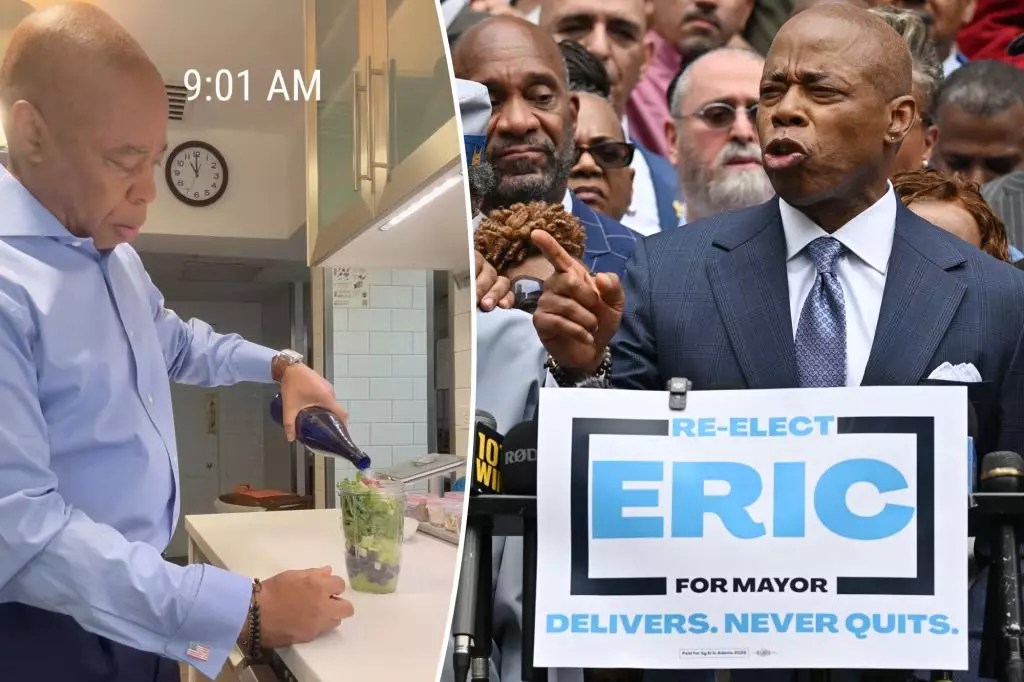In an era where political figures are increasingly struggling to connect with younger, digitally native voters, New York City’s Mayor Eric Adams is taking a refreshingly bold approach. Rather than relying on traditional campaign rallies or standard political messaging, Adams is embracing the influencer culture, transforming himself from a conventional politician into an authentic social media personality. This shift is more than a mere gimmick; it’s a strategic reinvention aimed at breaking down the barriers between himself and everyday New Yorkers.
Adams’ Instagram and other social channels now resemble the content seen on TikTok—think “get ready with me” videos, smoothie-making tutorials, and even mundane moments like ironing his pants. While this may sound trivial, the choice to highlight such day-to-day activities serves a crucial purpose: showing voters that he’s “just a regular human being.” His candidness about ironing or enjoying a cigar after hours breaks from the overly polished images often associated with politicians, giving a sense of accessibility and relatability that political campaigns often lack.
The Strategic Importance of Social Media in Modern Political Campaigns
One of the most striking aspects of Adams’ digital pivot is his understanding of social media not just as a communication channel but as the battleground of contemporary politics. His candid remarks about “legacy media” deliberately sidelining him expose a frustration shared by many politicians who feel filtered or misrepresented by traditional press outlets. Embracing platforms like YouTube and Instagram enables Adams to bypass these gatekeepers and speak directly to constituents—creating a personal connection that traditional news rarely achieves.
This approach signals a shift in how political legitimacy and visibility are earned. Gone are the days when press conferences and TV debates alone could sway public opinion; nowadays, authenticity and engagement on social platforms can be equally, if not more, influential. Adams understands this well, explicitly stating, “Social media is the game,” and expressing the need to “respect the game” if one wants to succeed. This savvy recognition positions him advantageously, especially as younger demographics become the most significant voters in an increasingly diverse city.
Authenticity Versus Performance: Navigating the Fine Line
However, while Adams’ influencer tactics come off as genuine attempts to humanize himself, there is a potential risk. When political figures adopt influencer culture, there’s always a danger of seeming performative or insincere—carefully orchestrated moments that could backfire if perceived as pandering or trivializing the office they hold. The challenge for Adams will be maintaining authentic transparency without letting his content devolve into shallow entertainment, which might alienate more serious-minded voters.
His openness about enjoying bourbon or cigars in casual settings pushes the boundaries of political decorum, raising questions about where professionalism ends and casual honesty begins. Still, his willingness to show both the “good and bad days” projects a refreshing vulnerability often absent in political discourse. This balance could redefine how urban elected officials engage with their constituents going forward.
Political Resurrection Amid Controversy
Adams’ reinvention comes against the backdrop of a highly controversial chapter in his career. Facing a federal bribery and corruption indictment with potentially devastating consequences, Adams was ultimately pardoned by former President Donald Trump—a political maneuver that not only saved his career but thrust him into the national spotlight. His assertion that he “did nothing wrong” and was unfairly targeted signals a narrative of victimization mixed with defiance, which he now leverages in his digital presence.
The decision to openly discuss this scandal, coupled with an acceptance of any endorsements “from anyone who loves this city,” demonstrates a pragmatic, inclusive reassessment of political alliances. It’s an embrace of complexity rather than simplistic partisanship. Yet, Adams seems keenly aware that transparency about his past and a forward-looking embrace of new media might be the keys to his political survival and relevance in a rapidly changing political and cultural landscape.
Redefining Political Engagement in the Digital Age
Ultimately, Eric Adams’ pivot to influencer-style politics isn’t just a quirky marketing ploy; it’s a case study in the evolving relationship between elected officials and their constituents. His approach acknowledges the growing importance of connecting with voters beyond speeches and policy briefs—through shared moments, lifestyle snippets, and a candid peek behind the curtain. Whether or not his social media strategy will secure his reelection remains to be seen, but it undeniably marks a transformation in how mayors and politicians might navigate the new political media ecosystem moving forward. By breaking down traditional barriers and embracing an authentic, sometimes messy, digital presence, Adams is pioneering a contemporary political persona—one ready to meet voters where they live, scroll, and engage.







Leave a Reply